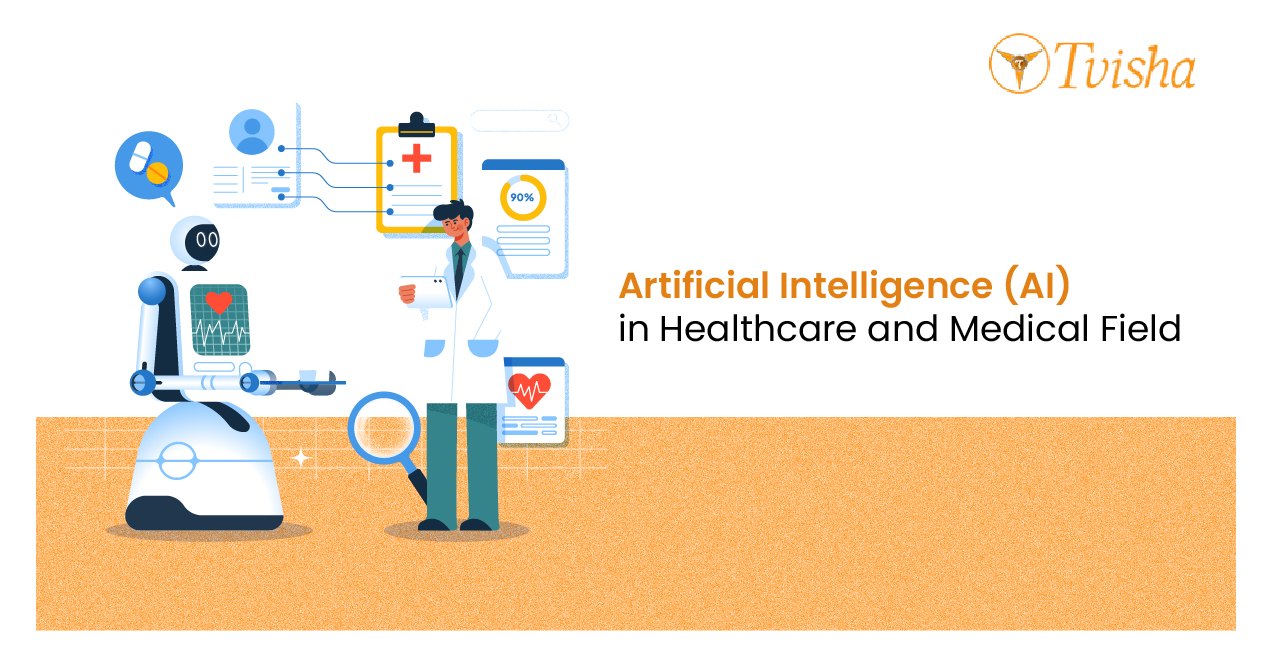
Artificial Intelligence (AI) in Healthcare and Medical Field
Step into the future of healthcare, where artificial intelligence (AI) plays a crucial role in transforming the medical landscape. From assisting doctors with diagnostics to streamlining administrative tasks, AI is making waves with its innovative applications. Imagine a world where chatbots answer patient queries and algorithms predict potential health issues before they arise. The possibilities seem endless as AI helps enhance healthcare accuracy, efficiency, and personalization, making it an exciting time for patients and professionals.
AI Applications in Diagnostics
Artificial intelligence is rapidly becoming a cornerstone in diagnostics, promising to revolutionize how diseases are detected and understood. Let's explore some of the groundbreaking applications of AI that are dramatically enhancing diagnostic capabilities.
Enhancing Diagnostic Accuracy
AI's most significant contribution to healthcare is its role in enhancing diagnostic accuracy. AI algorithms, particularly those based on machine learning, can sift through vast medical data and identify patterns the human eye might miss. This results in fewer misdiagnoses and more precise identification of medical conditions, ultimately improving patient care and outcomes. For instance, AI systems can analyze lab results, medical histories, and existing symptoms to provide a more accurate diagnosis, empowering healthcare professionals to confidently make informed decisions about a patient's health.
Early Detection of Diseases
Early detection of diseases is critical for successful treatment outcomes, and AI is proving to be a game-changer in this area. Algorithms are designed to recognize early warning signs of diseases such as cancer, diabetes, and cardiovascular conditions. These systems excel at detecting anomalies in data that hint at the onset of disease long before traditional testing methods can. For example, in cancer screenings, AI tools can assess radiology images to spot potential tumours in their infancy. The earlier a disease is caught, the better the chances are for successful intervention, and AI is leading the charge in making early detection a standard healthcare practice.
Imaging Analysis and Interpretation
Medical imaging is another field that has witnessed significant advancements thanks to AI. The interpretation of X-rays, MRIs, and CT scans has often relied heavily on the expertise of radiologists. However, AI algorithms can analyze thousands of images daily, identifying subtleties that may be overlooked during a busy clinical schedule. This helps provide accurate diagnostics and speeds up the process, allowing more patients to be served promptly. Additionally, AI systems can assist in highlighting specific areas of interest within the images, guiding radiologists to potential problem spots, and ultimately enhancing the overall diagnostic process.
Personalized Treatment Plans
AI is paving the way for more personalized and effective treatment plans. By understanding each patient's unique characteristics, AI technologies empower healthcare providers to offer individualized care that aligns with a patient's specific needs and health conditions.
Tailored Therapy Approaches
Gone are the days when a one-size-fits-all approach was the norm in medical treatment. With the advent of AI, therapy plans can now be tailored to each patient's genetic makeup, lifestyle, and disease profile. AI systems analyze many data points to devise treatment strategies most likely to succeed. This personalized approach enhances the efficacy of treatments and minimizes side effects. For example, in oncology, AI can assess genomic data to recommend drugs with the highest chance of success for a particular patient.
Predictive Analytics in Treatment
AI-driven predictive analytics is an innovative tool that aids in foreseeing how a patient might respond to a specific treatment. By evaluating past patient data and outcomes, AI can suggest which treatment paths are likely effective or may lead to complications. This foresight empowers doctors to adjust treatment plans proactively, minimizing potential risks and maximizing benefits. Predictive analytics also supports proactive disease management by anticipating future health issues and recommending preventive measures, making healthcare providers feel more prepared for potential patient outcomes.
Patient-Centric Care Models
AI is reshaping healthcare by promoting patient-centric care models. These models place the patient at the forefront, ensuring that healthcare services are tailored to meet individual preferences and conditions. AI platforms can integrate personal health data — from doctor visits to wearable devices — to offer comprehensive health insights. This integration facilitates better communication between patients and healthcare providers, promoting a more collaborative approach to healthcare. Patients are empowered to take charge of their health, making informed decisions based on tailored advice and recommendations generated by AI.
AI in Hospital Management
Artificial Intelligence (AI) is revolutionizing hospital management by optimizing processes, enhancing resource use, and improving the patient experience. Hospitals and healthcare facilities have quickly adopted AI technologies to meet the increasing demands of modern healthcare. With AI, administrators can ensure efficiency and effectiveness in their operations, making them feel more effective in their roles.
Streamlining Administrative Tasks
One of the most promising uses of AI in healthcare is streamlining administrative tasks. AI-powered systems can handle routine operations like scheduling, billing, and managing electronic health records. By automating these tasks, hospitals can significantly reduce the workload on healthcare staff, allowing them to focus more on patient care.
- Scheduling Appointments: AI algorithms can quickly analyze patient and doctor availability to provide the best appointment fit, reducing wait times and increasing patient satisfaction.
- Billing and Claims Processing: AI can automate billing processes by recognizing patterns and discrepancies. It assists financial departments in handling claims efficiently, minimizing errors and delays.
- Electronic Health Records (EHRs): AI can update and organize EHRs, making it easier for healthcare providers to access and analyze patient data for quicker and more accurate decision-making.
Resource Allocation and Efficiency
AI in healthcare goes beyond administrative tasks by optimizing resource allocation. Ensuring the right resources are available at the right time can improve patient outcomes and reduce unnecessary costs.
- Staffing: AI tools can predict patient inflow and outflow, helping hospitals allocate the correct staff. This predictive staffing ensures that there are always enough healthcare professionals.
- Supply Chain Management: AI can track inventory levels and predict when supplies will run out, leading to more informed purchasing and stocking decisions.
- Operating Room Scheduling: By analyzing previous data, AI can optimize the scheduling of surgeries, making it possible to maximize the use of operating rooms and reduce patient wait times.
Patient Monitoring Systems
AI-driven patient monitoring systems offer real-time tracking of a patient's health status, thus improving the quality of care while easing the burden on healthcare providers.
- Wearable Devices: These devices track vital signs and other health metrics, providing continuous data that AI systems can analyze to detect anomalies or predict medical events before they occur.
- Remote Monitoring: Especially useful for chronic conditions, AI-enabled remote monitoring tools allow healthcare providers to monitor patients from a distance, ensuring timely intervention without hospital visits.
- Alerts and Notifications: With AI, healthcare professionals receive automatic alerts and notifications about critical changes in patient conditions, facilitating prompt and potentially life-saving actions.
Challenges and Ethical Considerations
While AI offers numerous advantages in healthcare, significant challenges and ethical considerations must be addressed to harness its full potential responsibly.
Data Privacy and Security
As AI systems rely heavily on data, safeguarding patient information is paramount.
- Data Breaches: With the increase in digital health records, the risk of data breaches becomes a pressing concern. AI systems must have robust security measures to protect sensitive patient information.
- Consent and Confidentiality: It is crucial to ensure AI systems comply with data protection laws like HIPAA. Patients should be fully aware of and consent to how their data is used and stored.
Ethical Implications of AI in Medicine
AI in healthcare also brings with it ethical dilemmas that need careful consideration.
- Bias and Fairness: AI systems can inadvertently perpetuate biases in the data they're trained on. It's essential to ensure that AI does not favor a particular demographic or result in discriminatory practices.
- Decision-Making Authority: The role of AI in healthcare decisions should always remain supportive rather than dominant. Healthcare providers must maintain authority in decision-making, using AI as a tool rather than a judge.
Overcoming Technological Barriers
Challenges persist in the seamless integration of AI into healthcare systems.
- Interoperability: Different systems must work together seamlessly. Ensuring that AI tools can integrate with existing healthcare technologies is essential for maximizing their utility.
- Training and Adoption: Educating healthcare personnel about AI tools and encouraging their adoption can be challenging but is necessary for successful implementation. User-friendly interfaces and comprehensive training programs can ease this transition.
- Cost and Accessibility: While AI can drive cost savings in the long run, the initial investment can be prohibitive for many institutions. Finding ways to make AI-solutions affordable and accessible remains a challenge.
By addressing these challenges proactively, the healthcare industry can effectively integrate AI technologies, maximizing their benefits while minimizing potential drawbacks. As AI continues to evolve, its role in healthcare will only grow, offering exciting prospects for the future of medical care.
A mobile app development company can play a crucial role in transforming healthcare by integrating AI technologies. From improving patient engagement to enhancing diagnostic accuracy, the potential applications of AI in mobile healthcare solutions are vast and promising. By staying at the forefront of these innovations, app developers can contribute significantly to the future of healthcare.
Leveraging AI in Healthcare: A Mobile App Development Company's Approach
1. Enhancing Patient Engagement: AI can be integrated into mobile applications to personalize patient interactions. By analyzing user data, apps can provide tailored health advice, medication reminders, and appointment scheduling, improving overall patient engagement.
2. Streamlining Diagnostics: Mobile apps can utilize AI algorithms to assist healthcare professionals in diagnosing conditions more accurately. By integrating machine learning models, apps can analyze medical images and patient data to provide preliminary assessments, thus aiding in quicker decision-making.
3. Predictive Analytics: With AI, mobile applications can predict patient outcomes based on historical data. This capability allows healthcare providers to identify at-risk patients early and implement preventive measures, ultimately improving patient care.
4. Telemedicine Solutions: AI-powered mobile apps can enhance telehealth services by facilitating virtual consultations. Features like automated symptom checkers and chatbot support can provide immediate assistance and streamline the patient-provider interaction.
5. Data Management: AI can help manage vast patient data. A mobile app can employ AI algorithms to organize, analyze, and retrieve health records efficiently, ensuring healthcare professionals can access the most relevant information at their fingertips.
6. Remote Monitoring: Mobile apps equipped with AI can monitor patients' vital signs and health metrics in real-time. This capability allows healthcare providers to track chronic conditions and adjust treatment plans proactively.
7. Personalized Treatment Plans: AI can help develop personalized treatment plans by analyzing a patient's health data and genetic information. Mobile apps can offer recommendations tailored to individual needs, leading to better health outcomes.
Conclusion
In summary, artificial intelligence in healthcare is revolutionizing the field. From accelerating diagnosis accuracy to personalizing treatment plans, AI is enhancing the quality of patient care. It is streamlining operations, reducing costs, and improving patient outcomes. The journey of AI in healthcare is still in its early stages, and the future looks promising. As technology evolves, so will its contributions, opening new frontiers in medicine. Embracing AI today means preparing for a healthier tomorrow.











 Whatsapp
Whatsapp
 Email
Email


